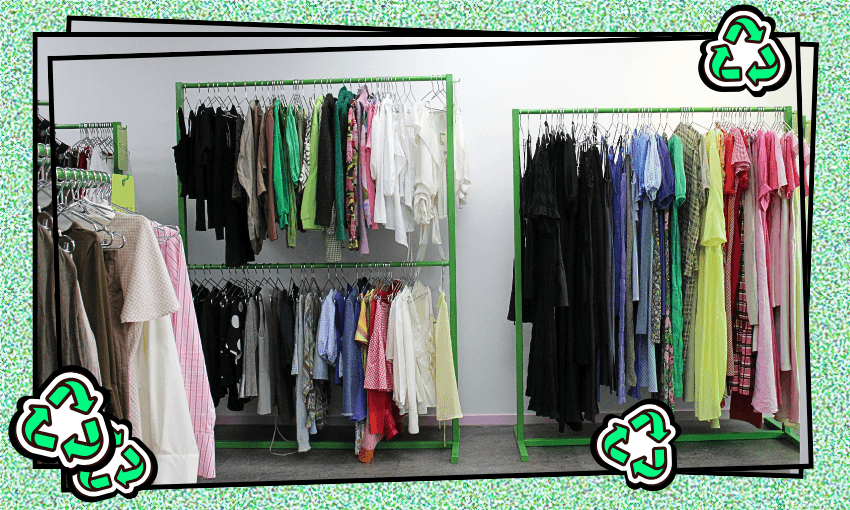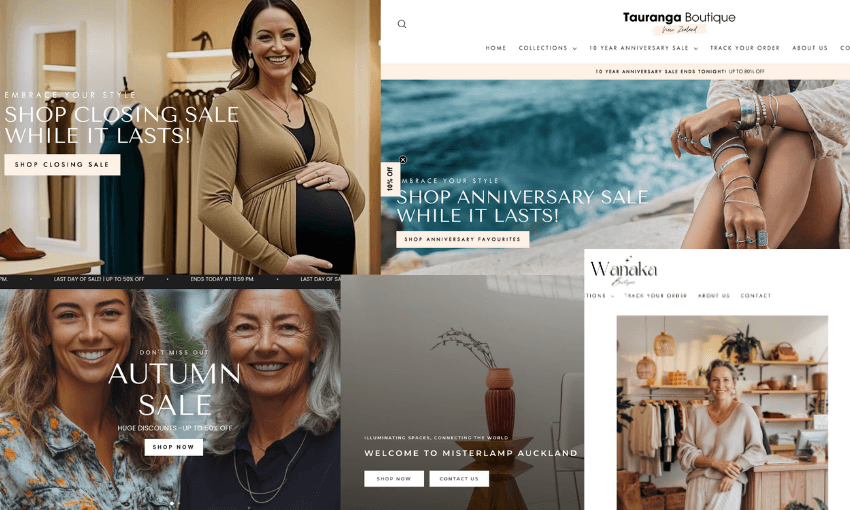Ruby opening the first own-brand secondhand store in Aotearoa continues a trend – designers are buying back their products and reselling them. Is it a good business model, a worthy attempt at sustainability, or simply greenwashing?
A fresh green sign hangs above shoppers wandering along Broadway, the main drag of Auckland’s shopping mecca, Newmarket. On it, white text denotes what’s beyond the door: Ruby Says Recycle. Inside clothes hang on green racks. They’re arranged by size, and each garment bears a Ruby tag on its waist or neckline. There’s a fluffy blue vest, then a long slinky dress and a butter-coloured shirt with a swing tag that says “Sample: wrong fabric”. A few coathangers down, a tan mark runs from the armpit to the breast of a white dress. All the clothes here are either secondhand or some sort of surplus from the production of new Ruby items, like samples or seconds.
Around the corner on York Street there’s a Kowtow shop. It’s a carefully curated space, with crisp brand new multiples of the same designs lined up in size order. Colour seems designated to specific areas of the space, until you get to the Relove rack, where different colours and patterns hang side by side. It’s full of secondhand Kowtow pieces that have been brought back by customers in order to resell.
For customers, buying high-quality secondhand clothing from a retail shop is nothing new. Tatty’s Designer Recycle, Recycle Boutique and the like have been selling used high-quality clothing by consignment for decades across New Zealand’s high streets. Globally, the resale market is quickly growing. It’s expected to hit a value of $47 billion by 2025, a growth driven by millennials and zoomers. Earlier this year it was revealed that Vinted, an online vintage marketplace, was the leading clothing retailer in France. There’s a slew of others like it, such as Depop and New Zealand’s own Designer Wardrobe, as well as people selling through Trade Me and Facebook Marketplace. Ruby and Kowtow are among Gucci, Rolex, Ralph Lauren, Patagonia and Adidas in recognising secondhand markets as commercial opportunities. Instead of watching third-party platforms profit from their products, they’re capturing that market themselves. The term being used is recommerce.
Leading the messaging for the reselling schemes at Ruby and Kowtow are words like sustainability, mindful, circular and care. The Ruby Says Recycle branding is literally green. While these things are not untrue, there’s another bottom line. “We are a business,” says Emily Miller-Sharma, the general manager at Ruby. “We do need to be profitable.” She’s worked at Ruby for 17 years, since her family bought the brand in 2008, and has become known in the industry as a gentle disruptor – particularly in her role founding Mindful Fashion with Kate Sylvester in 2019.
Miller-Sharma says that for several years she has been testing out different business ideas that have tried to reduce waste and overconsumption. “Sometimes I feel like I’m asking my team to follow me down this gnarly garden path that may or may not lead us to utopia – I don’t know,” she says. There are the sewing patterns that are printed on the ends of rolls of newspaper, the handbags knitted from offcuts, and then this, Ruby Says Recycle, which started as an Instagram account selling samples during lockdown in 2021, progressed to single racks in stores, pop-ups and now a permanent space on Broadway. “It has really worked,” she says. “People are really into this.”
Miller-Sharma is excited that reselling clothes can “be a grown-up business model”. It’s this financial success that makes the scheme sustainable. So how does it work exactly? Ruby has been making clothes since 1999, so there’s 26 years’ worth of stock somewhere out in the world. “There’s just so many, so many, pieces in people’s wardrobes just waiting to come back,” says Miller-Sharma. “It’s almost like an infinite resource.”
Ruby reaches out to their customers in store and online to tell them about the scheme and encourage them to bring their clothes back in. Garments can be returned to any Ruby shop (they have locations in Auckland, Mount Maunganui, Hamilton, Wellington and Christchurch), where they are inspected and the seller offered a price that is 20-40% of what the resale price will be, paid as a store voucher that can be used on new or secondhand Ruby clothing. The payoff might not be as high as what could be gained through selling something yourself, but there’s no messing around with taking photos, answering messages or other faff associated with reselling clothes. Plus, they don’t have to wait for the piece to sell: sellers are given their vouchers immediately. Close to 8,000 pieces have been returned so far.
The aim is to receive at least 400 used pieces each month to stock the shop, says Miller-Sharma, to which Ruby will add around 100 samples (prototypes of garments made before mass production). The business’s goal is to generate a quarter of its revenue from something other than new clothing by 2030. In the 2025 financial year, which ended on March 31, Ruby Says Recycle made up 6% of revenue, and is projected to reach 7% this financial year. At the moment it makes most sense to sell the secondhand clothing in a bricks-and-mortar store, says Miller-Sharma, because preparing each individual item for online sale would be too labour intensive. Even in its current form, the scheme has been “a bit of an administrative bitch to start”, says Miller-Sharma. Still, an online system for people who don’t live near a Ruby store to return their clothing is the “next frontier”.
This is exactly the approach that Kowtow has taken. Relove launched in November 2024 after a long road trying to find, then build, a digital platform that would allow for what the team wanted to do. “It was a real struggle,” says Tessa Bradley, the head of product and sustainability. They would have loved something to “plug in” to their website, she says, but it simply did not exist.
The system they built guides customers through an online form, then gets them to upload photos of the Kowtow garment they want to resell. This information is sent through to a coordinator who initially checks that the garment fits the requirements for resale and makes a provisional offer, which can be up to 40% of the resale price paid in Kowtow points to be spent on new purchases. If the seller accepts, they can either send the garment to the workroom or drop it off at a Kowtow store in Auckland, Wellington or Melbourne. Once the coordinator checks the garment, the Kowtow points are credited to the seller’s account. Relove clothing is sold online, on a permanent rack in the Wellington store and currently on pop-up racks in the Auckland and Melbourne stores.
Bradley “wouldn’t say that it’s a huge profit driver”. By nature of each piece being individual, the system is laborious. Instead, Relove fits into a certain Kowtow ecosystem, along with their promise of free repairs for garments and the regenerate programme, where Kowtow takes garments back if they’re no longer considered wearable. Bradley says the driving force is a commitment to circularity, waste reduction and taking responsibility for the full life of the garment. Care has also been taken to make sure that selling and buying Relove items is a “curated and brand-aligned experience”.
Kowtow has not put a number on how much Relove they want to sell or how much profit they want it to generate, “which is kind of crazy,” admits Bradley. “Maybe I need that. That might be my next step, so I’ve got a little bit of a goal.” Still, she says the programme is “doing really well” and exceeding expectations. More than 1,000 pieces have been returned in a “steady stream” and sales are keeping pace. There are new customers for whom the lower price point allows accessibility to the brand and existing customers who come in for something new and then add on a Relove piece “that they may have missed out on from a previous season”. The success will likely lead to growth – Bradley would love to open a permanent dedicated store “one day” and has pop-up shops in her sights first. “We can’t get enough. We just want more, more, more.”
Back on the bright green couch in the Ruby Says Recycle shop on Broadway, Miller-Sharma says she wants people to know how successful the venture is, because “everyone can do this”. She loves that the shop is a few steps down from the old Smith & Caughey’s and the giant Glassons, that secondhand clothing is competing with that retail giant and taking space in a sophisticated shopping strip. “It gives me a glimpse into what the future could be. This could be the height of luxury.”


